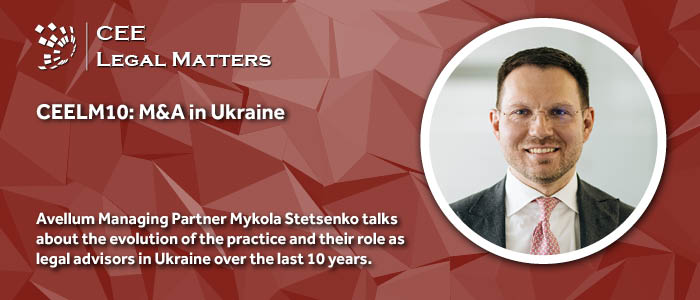Avellum Managing Partner Mykola Stetsenko talks about the evolution of the practice and their role as legal advisors in Ukraine over the last 10 years.
CEELM: What types of projects have kept your M&A team busy? How has that evolved over time?
Stetsenko: Inevitably, lawyers closely align with clients’ needs across industries. Significant shifts in sectors such as agribusiness, FMCG, machinery, and IT over the past decade naturally impacted our work. Our M&A team handles diverse deals, including traditional strategic M&A transactions with share-purchase agreements and shareholder agreements. We also have a significant focus on private equity, with a noticeable surge in both private equity firms and transactions post the Revolution of Dignity in 2014. The third area is the IT industry, involving lighter M&A deals, primarily at the US and sometimes EU levels, that involve Ukrainian elements. While due diligence in such deals is much smaller in size, we cover employee, tax, strategic, and data protection issues. The fourth area covers traditional corporate advisory work.
CEELM: In terms of volumes, what were noticeable highs and lows in the past decade?
Stetsenko: There were three major lows workload-wise: the revolution in 2014, the COVID-19 pandemic in 2020, and the war in 2022. Compared to the war, the revenue dip during the former seems insignificant. Today, we are still in the process of fully recovering, especially in terms of the sheer volume of work. Our most intense moments, on the other hand, correspond with the lows: following the revolution in 2014 and the election of the new president and government, there was a surge of reforms that significantly fueled M&A activity in Ukraine. The peak period was likely 2017-2018. In 2021, post-pandemic, previously delayed investments were finally able to materialize, giving us another super busy year.
CEELM: How have the client profiles evolved over the last decade?
Stetsenko: We’ve observed an increase in the number of private equity investors and growing interest from venture capital investors in Ukraine, particularly in the dynamic IT sector. The transformation in profiles, especially in renewables, has been remarkable, with younger and more diverse management and shareholders rapidly making strides. It’s been exciting to witness young managers and IT gurus evolving into experienced entrepreneurs, developing and selling innovative businesses. In the latest wave, defense start-ups entered the market, bringing a somewhat different crowd compared to IT specialists. In defense, the primary focus is on engineers specializing in physics and math, and many are relatively young. It’s gratifying to see these individuals applying their skills to the development of drones and anti-drone systems.
CEELM: What about their needs? What new expectations do you see from clients?
Stetsenko: Clients have certainly become more sophisticated. For instance, a decade ago, encountering a client who would consider a shareholder agreement was less common. Now, clients anticipate that their lawyers are highly experienced in a range of instruments they’ve heard of, not just simple shareholder agreements but also various convertible shares, liquidation preference options, etc. Clients also expect that, with technological advancements, tasks can be completed more efficiently or cost-effectively. It may be true, particularly in standard transactions, however, when dealing with bespoke agreements and intensive negotiations, there is a unique aspect to the documentation that goes beyond what was seen more than 10 years ago.
CEELM: What have been the main recurring challenges you have faced in making deals happen?
Stetsenko: In most cases, I believe that there has been a simplification and an increase in the number of instruments, particularly in M&A. Regulators have also streamlined processes, especially for small and mid-sized transactions, aligning regulations with best practices. Ukraine continues to harmonize legislation with the EU. Corporate law has seen improvements, exemplified by the detailed and flexible regulations for privately owned corporations. Business registration, for instance, in Ukraine is now quicker (only a matter of a few hours) and done online. Interestingly, we recently handled a distinctive case involving the conversion of preferred shares into ordinary shares. While it may sound simple, our legislation didn’t cover it, prompting us to draft new legislation, lobby with the regulator, and finally obtain an approved regulation. In the past, our firm also played a pivotal role in introducing shareholder agreements as a legal instrument in Ukrainian law.
CEELM: What do you believe will be the highlights in a similar interview 10 years from now?
Stetsenko: I believe that in 10 years, Ukraine will be a part of the EU, and our legislation will become more complex. With technology advancing rapidly, laws and regulations will need to catch up. Looking back, there were few or no laws on data protection a decade ago, but now regulations are expanding every year. The same is true for artificial intelligence, where issues like the regulation of self-driving cars will likely become more prevalent. I anticipate an increase in virtual reality and augmented reality, requiring additional regulation. However, despite these changes, I think we will still be involved in M&A deals because they reflect human nature. Regardless of simplified regulations, people enjoy bargaining, and M&A is about finding the best buyer willing to pay the highest price – a dynamic driven by competing forces that is true from both a commercial and legal perspective.
Avellum is CEE Legal Matters' Practice Leader for Corporate/M&A in Ukraine for 2024 – learn more here.
This article was originally published in Issue 10.11 of the CEE Legal Matters Magazine. If you would like to receive a hard copy of the magazine, you can subscribe here.


